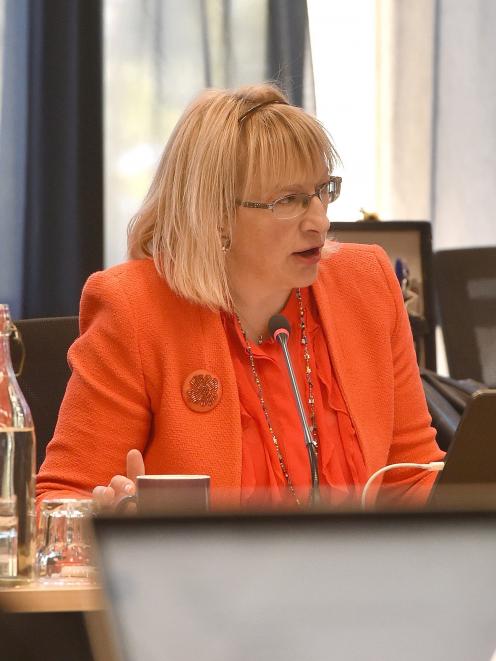
Deep into a discussion about Dunedin City Council and Aurora Energy debt and investment returns, a councillor was accused of stating a mistruth.
In the end, the point was considered near enough to the truth that no backdown was considered necessary. It also gets to the heart of why the council might yet sell Aurora despite stiff public opposition.
The issue is their growing combined debt and whether it is feasible or desirable for two capital-hungry entities to stay tied together. The finances of both could benefit from a split, it might be argued.
There are, of course, various arguments for selling the electricity distribution company. They include the prospect of a different form of asset — a diversified investment fund — being of more use to the council by providing a relatively stable revenue source, potentially offsetting rates rises, repaying debt or quickening a return to running surpluses.
Arguments for keeping the company include certainty it will grow significantly in value and the likelihood of continued heavy investment now reaping rewards in the long run.
One way or another, it is a call worth hundreds of millions of dollars.
No asking price has been declared but a sale would make a big dent in the combined debt of the council and its companies — group debt — and the council has said sale proceeds could create an investment fund worth hundreds of millions of dollars.

Such themes were traversed through a three-day hearing last month and came into particular focus when former council group chief financial officer Grant McKenzie had his say. Mr McKenzie is now Allied Press chief executive but told the hearing he was presenting his thoughts as a Dunedin citizen and in opposition to a potential sale.
Lack of a dividend from Aurora since 2017 had been referred to in the council’s statement of proposal among the key reasons to sell. Aurora is the largest business within the Dunedin City Holdings Ltd (DCHL) group of companies and DCHL concluded there was a compelling case to sell it. The council is essentially considered to have an asset mix tilted towards delivering capital growth rather than cash distributions.
Mr McKenzie said DCHL had paid the council a dividend once in the past five years but it had also reduced its borrowing by $6.4 million in that time. It had prioritised repaying debt over paying a dividend, he said.

Mr McKenzie agreed this was not a fantastic return but he referred to business investment cycles — and it was a heavy one at the moment for Aurora. Rewards from borrowing should be reaped in the future, he said.
Cr Vandervis said Aurora seemed to be "very investment-hungry" and it needed to invest far more money in Central Otago for a start. The two lines to the growing Wanaka market were utterly inadequate, he said. What would Mr McKenzie say to claims money was not available to optimise the value of Aurora and to run Central Otago region lines in a way that was reliable or gave a return?
Mr McKenzie said he had aimed to show this could be funded by debt and the return was still greater — it could continue to be funded by debt in the short term.
Cr Vandervis: "What if our debt ceilings and our agreements with the [Local Government Funding Agency] mean we simply can’t raise the money, as I believe is the case? We’re at our debt ceiling now, and far more money is required to optimise ... "

Before making a ruling as the meeting chairman, Dunedin Mayor Jules Radich said his observation was "we are heading towards our debt ceilings".
Cr Vandervis: "We recently raised the [group] debt cap from $1.4b to $1.6b and I have it from [DCHL chairman Tim Loan] that he believes within two years the $1.6b won’t be adequate either."
An adjournment was called and Mr Radich said afterwards he was not upholding the point of order. Cr Vandervis was making the point "it is budget that we will hit the debt ceiling ... we have budgeted already to get to our LGFA covenants", the mayor said. He added for Cr Walker’s benefit "there’s no need for you to be interrupting".
The discussion prompted Cr Sophie Barker to seek clarity from council staff.
Their response on May 16 was in effect the group debt ceiling was $1.6b and current borrowing was just under $1.3b, so there was about $300m of room under the cap. Council debt — excluding company debt — was budgeted to increase to $707m by July next year and it was stated the current council debt was $590m. The $707m would be 188% of revenue and the debt limit in the council’s financial strategy was 250% of revenue.

If there’s a counter-argument to the notion of $300m of clear space existing under the $1.6b cap, it is probably that a graph exists right now showing forecast group debt almost hitting the $1.6b ceiling in 2026.
For the sake of completeness, as the Otago Daily Times reported in July last year, the combined debt ceiling was raised to $1.6b from $1.2b, rather than from $1.4b.
The situation with the LGFA takes some explaining and it is a genuine factor in the mix.
The upshot is the council’s escalating group debt situation takes it close to an LGFA cap for interest, which cannot exceed 30% of rating revenue.
"If Aurora is not sold, then the 30% is likely to be pressed in the early 2030s," a report for councillors said.
"If Aurora is sold, then this would significantly reduce the ratio of interest expense to rates revenue."
LGFA chief executive Mark Butcher said in June last year Dunedin’s situation was unusual because the way the council and council companies borrowed money meant they were treated as one group.
If a sale does not go ahead and a way out of the covenant proves to be difficult, the council and its companies may be forced to curb some spending, or divest something else.
DCHL is sure to say more about the LGFA before the council is due to decide next month if it wants to put Aurora on the market.
In the meantime, the public may well wonder if talk of a council debt crisis is overblown.
At least two figures continue to suggest a challenging group debt situation. Planned investment in the Aurora network was in the order of $800m over the next decade, the company’s statement of intent for the current financial year said. As for the council, it signalled about six months ago it might need $1b of capital expenditure in the next decade just for Three Waters.
However, some councillors are wary of a mentality of rising debt being considered generally bad, given it is typically how growth is financed and how paying for assets is spread over the lifetime of their use.
Mr McKenzie was asked by Cr Christine Garey for his general perspective and he said council debt and business debt should be considered differently.
Council debt was like home debt and though he had some unease about the extent of its rise, it was driven by the council "doing so much", he said.
The numbers Mr McKenzie had run on Aurora’s debt suggested the business could afford it, as it was getting a greater return than the debt’s cost.
The discussion with Mr McKenzie was just one snapshot from a broader debate — to sell or not to sell — and the verdict from the hearing was clearly to keep the company. A debate Dunedin has not yet really had is what might be necessary if the council does not sell Aurora.
Whatever councillors decide, the debating will get no easier. Figuring out the spending programme for the 2025-34 long-term plan looms as an immense challenge and it will be settled in an election year.












